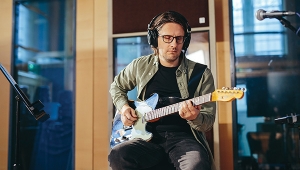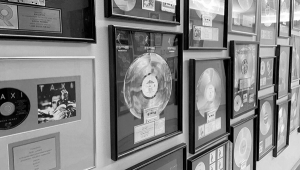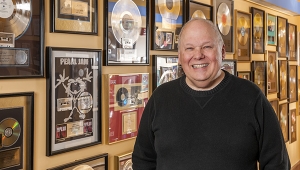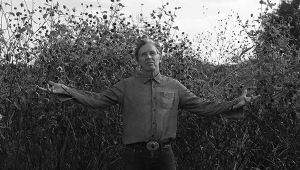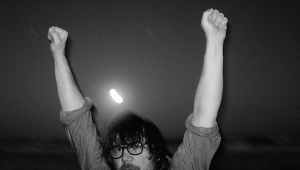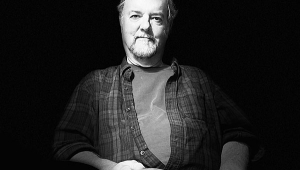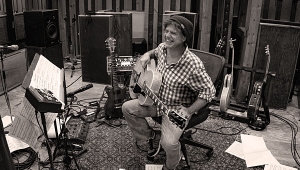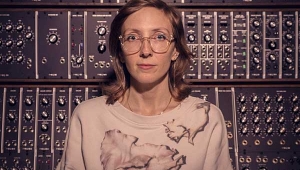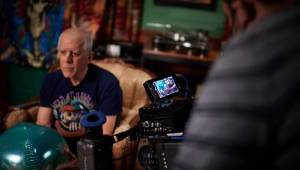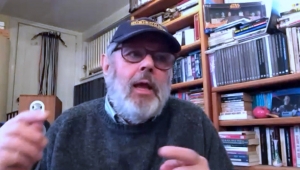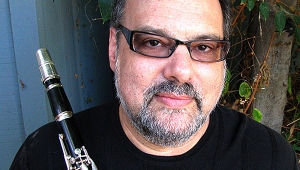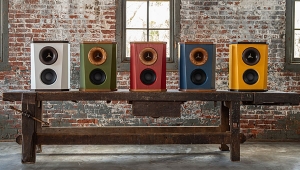| Columns Retired Columns & Blogs |
Tam Henderson, Reference Recordings Page 3
Many people would be surprised that it is so immediate sounding and so dynamic. Some will like it, some won't. I like it a great deal—it's an exciting sound. It hasn't so far been a big success in the marketplace, though. Most audiophiles say, "Ugh, harpsichord, echh. It's dull and boring, it has no bass drum, so forget it."
Atkinson: Was Professor Johnson's Astounding Sound Show [RR-7] from 1979 the first Reference Recordings album to have been engineered by Keith?
Henderson: No, though that was the first one that got a fair amount of notice. We did two prior to that. Steven Gordon Plays Chopin, the Sonata in b [RR-5], was the first thing we did, and then there was another about the same time of jazz piano and string bass called First Takes [RR-6]. Those were all mastered at 45rpm. And the original edition of the Sound Show was also at 45rpm. We did 45 consistently until a couple of years ago. And, frankly, I think that's one of the things that has kept this company small and poor for so long! Because its appeal is strictly to audiophiles. The general public is not even remotely interested in 45rpm LPs. And the artists don't understand it; they say, "I want my friends to buy these records..." Every label that has attempted to market 45rpm LPs has abandoned them.
It's difficult enough these days to market LPs. They can't be weird LPs as well. We do want to stay in business.
Atkinson: But then the CD came along and presumably gave you access to a wider market.
Henderson: Well, yes, that's what we thought. The first two years of CD, however, were very, very difficult for small labels because of the shortage of manufacturing facilities. There was a great shortage of CDs, yet those were the two years when nobody wanted to buy LPs because the CD had arrived. We couldn't get CDs made and it very nearly put us under. Not only our label, but a number of other small labels as well. Luckily that's behind us, and the waiting periods are no longer a problem. And even such a small label as Reference Recordings is getting calls from CD plants from all over the world, soliciting business. There's now an excess of capacity, thank goodness.
Atkinson: One thing that has puzzled me for some time is that you make your CDs from digital masters rather than from Keith's analog machine. Why is that?
Henderson: On all new projects, we run two machines. We make the LP from the analog tape and the CD from the digital tape. It's a lot of extra work and it's a lot of extra expense, but the reason we do it that way is to try to give everybody who is interested in our work the format that they would prefer to hear. CD fanciers want their digital, and if it doesn't say "DDD," they're either disappointed or they just don't buy it at all. On the other hand, we feel that people who are drawn to the sound of our analog LPs want their analog. So we don't cut the LPs from the digital tape, for that reason.
I have to edit everything twice, therefore. Well, three times actually. I do practice edits first, from copies, to figure out where I have to make the edits. Then I edit the analog and digital tapes. And digital editing is a tremendous expense.
Atkinson: Do you use the Sony digital editor?
Henderson: No, we use the JVC at present. Though the JVC has problems too, I think it sounds a little better than the Sony. But this is an interim thing; there is a new generation of digital editors using hard-disk computers that I hope will sound significantly better. The main drawback in digital recording and processing these days is the editors.
Atkinson: More so than the initial analog-to-digital conversion?
Henderson: Well, that depends on which convertor you're talking about. But I can tell you that I know what I take into the editing facility, and I hear what comes out. It isn't the same. Information is lost; there's a grainy, hard, well, "digital" sort of sound that creeps in, but there's no way to avoid it because everything has to be edited in one form or another.
Atkinson: There have been companies that have said, "We'll produce recordings without edits," but that policy seems to fade very quickly in the light of public reaction against the occasional wrong note.
Henderson: Precisely, and the artist isn't happy either. I do as little editing as I can get away with, but I will do as much as necessary to get the best possible performance out of the materials that we have.
Atkinson: It depends, of course, on your artists. An acquaintance who works for a major company related a horror story of how he was asked to produce a hot new young pianist; he found he had to do an endless number of edits to make this pianist appear to be an artist.
Henderson: There are many industry tales about such things. I enjoy the editing process. Of all the different things that I have to do to make this little company operate, I think I'm best at editing. That's my real calling in life.
In classical music, editing is much more straightforward. You have the score and after a while you can tell where you can get away with edits and where you just needn't bother because you know from past experience that it won't work. The most difficulty I have in editing is in popular and jazz music. You have say three or four takes of a tune, and they won't be the same. The artists won't be together at the same spot that they were in the one that you're trying to fix. And that's terribly limiting. It's a real challenge.
Atkinson: Could you expand on your thoughts on the state of digital recording?
Henderson: Frankly, I am disappointed that so many audio fanciers seem to be satisfied with digital sound as it is today. I know the reasons why. CD is popular, that's perfectly obvious, and it has to be because audiophiles are simply not aware of what is missing in current digital recordings. We are able to hear our microphone feeds at the sessions. We hear what the analog machine does to that signa' it does certain things, it's not a perfect medium by any stretch of the imagination. And we hear what the digital machine does to the signal. It's far from perfect also, but it seems to be more subtractive in nature. It loses information. Even the convertor we're now using, which is a highly modified thing that Keith has had his way with—it's clearly better than any of the other ones I've heard—has pretty serious difficulties in certain areas. But digital sound certainly has taken over faster than I ever dreamed possible.
Don't get me wrong. I'm not so enamored of the LP that I'm oblivious to its shortcomings. There are serious shortcomings to the LP medium. I wish there were something better for us to preserve our analog recordings and circulate them to the public. But it is the only real analog medium apart from cassette, which doesn't work at all. So there we are, stuck with the LP as it exists. It's becoming increasingly difficult to make a good LP, but that's another whole can of worms.
- Log in or register to post comments
